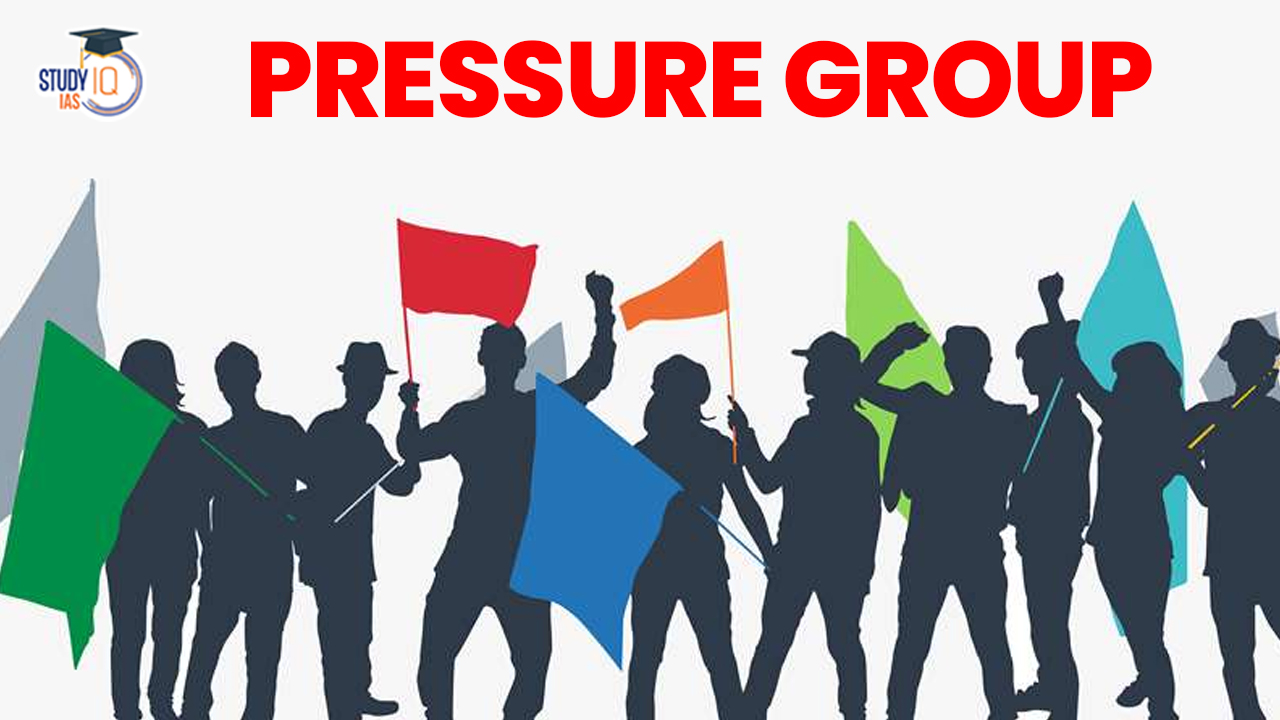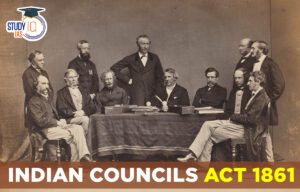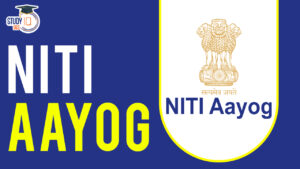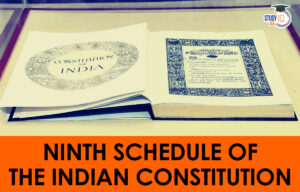Table of Contents
Pressure Groups
Pressure Groups are associations of individuals who band together to advance a cause. Though pressure groups are frequently associated with politics, this is not a need for all of them. They may be non-political, formal, or unofficial organizations. The IMA, ABVP, FICCI, and AITUC are a few instances of pressure groups that are prevalent in India. Students can also go for UPSC Mock Test to get more accuracy in their preparations. For more details about UPSC Syllabus, student can visit the UPSC Syllabus page of StudyIQ.
Pressure Groups Meaning
You might have seen news like “RSS’s statement on Tablighi Jamaat” or “FICCI’s call for government support in the Aviation industry” and wondered what these groups are and why they matter. These organizations, known as Pressure Groups or Interest Groups, consist of people with shared interests who work to influence public policies.
The term “Pressure Groups” started in the USA and refers to organized groups that promote and defend their interests. In India, such groups have been active since colonial times, with the All India Trade Union Congress being the first.
Pressure Groups in India’s Role
Pressure groups play an important role in various systems, including administration and politics. Here are some of their key functions:
- Political Influence: They help introduce candidates into the legislature and assist parties in winning elections by preparing manifestos and mobilizing voters.
- Executive Positions: They aim to place individuals in key executive roles who align with their interests, affecting policy implementation.
- Influencing Bureaucracy: Pressure groups try to influence bureaucrats, who have long tenures, by providing favorable feedback.
- Link Between Government and People: They serve as a vital connection between the government and citizens, ensuring that government actions align with their interests.
- Voicing Minority Needs: They express the views and needs of minority communities that might otherwise go unheard.
- Providing Expertise: Pressure groups offer valuable information and expertise to the government on various issues, like Indigenous rights.
- Political Participation: They create opportunities for political involvement without requiring membership in a political party.
Pressure Groups Characteristics
Pressure Groups are known to cooperate with the political system on behalf of the general welfare. The Pressure Groups support political parties financially and keep in touch with bureaucrats. They also participate in customary social behaviors to increase their visibility and power, such as focusing on caste-related issues and running for office on the basis of their religious beliefs.
Because pressure groups bring up important issues such a lack of resources, they shouldn’t necessarily be seen negatively. These Pressure Groups take some time to adapt to any changes in social or economic conditions, whether they occur immediately or after a given amount of time, upsetting the established order.
Pressure Groups Types
The most influential pressure groups in India are the business groups, which are made up of highly developed and influential industries and commercial entities. As an illustration, consider the FICCI (Federation of Indian Chambers of Commerce and Industry). Many UPSC hopefuls are aware of trade unions since we know that these organisations speak out to demand the real needs of industrial employees. Labor organizations also include trade unions. The All India Trade Union Congress (AITUC), for example.
Agrarian organizations represent Indian farmers and their concerns to the government. For example, the Bhartiya Kisan Union (BKU) opposed a recent agriculture bill proposed by the government. Professional groups, such as the Indian Federation of Working Journalists and the Indian Medical Association, advocate for their members’ rights and standards. Student organizations are also prominent in Indian colleges, like the Akhil Bharatiya Vidyarthi Parishad (ABVP). Religious organizations, such as the Rashtriya Swayamsevak Sangh and Jamaat-e-Islami, play a significant role in politics. Caste is another important factor, leading to many conflicts and rivalries, with groups like the Marwadi Association and Kshatriya Mahasabha representing specific castes. Tribal organizations are active in states like Jharkhand and Chhattisgarh, sometimes resorting to protests to demand government attention, such as the United Mizo Federal Organization.
India’s diverse languages have led to various linguistic communities, including Tamil Sangh and Hindi Sahitya Sammelan. Additionally, ideological pressure groups, like civil liberties and democratic rights organizations, have emerged. Some groups, known as anomic groups, may resort to extreme actions, such as riots and assassinations, to achieve their goals, like the Jammu and Kashmir Liberation Front led by Yaseen Malik.
Pressure Groups Function
In every society, whether democratic or totalitarian, pressure groups attempt to change public policy in their favour by either refusing to directly take on the responsibilities of running the country or by refusing to run for office.
Groups that exert pressure call for favourable administrative and policy decisions. They frequently alter the way they conduct business. Group politics in pressure groups are influenced by the interaction of governmental institutions, activities, and attitudes towards the scope or intensity of their interests..
Pressure Groups Advantages
- Freedom of Expression: Joining an interest group allows you to share your ideas with others who think like you, helping to create change that affects your life.
- New Perspectives: Interest groups expose you to different viewpoints, helping you see beyond your own beliefs. They participate in shaping legislation and consider the impact on specific communities.
- Holding Power Accountable: By working together, interest groups can hold those in power accountable, ensuring they act in the public’s best interest.
- Facilitating Change: Being part of a group can amplify your voice, making it easier to influence decision-makers on important issues.
- Promoting Fairness: Interest groups strive for equality by addressing issues like poverty and corruption, helping everyone access opportunities.
- Building Leadership: They encourage community leadership, allowing individuals to advocate for needed changes, often through social media and other platforms.
- Access to Information: Members of interest groups gain valuable resources and can connect directly with elected officials.
- Lobbying for Change: These groups work to turn information into laws and influence officials toward legislative changes.
Disadvantages of Interest Groups
- Loud Voices Prevail: Active groups often dominate attention, and wealth can amplify influence, leading to inequality.
- Political Blame Game: Political parties may blame each other, and small groups can appear to represent the majority, creating misunderstandings.
- Self-Interest Focus: Groups may prioritize their own interests over the common good, leading to a lack of compromise.
- Offensive Views: Some groups hold extreme views that can cause communal tensions and attract media attention.
- Conflict Between Groups: Competition between interest groups can lead to civil unrest, as seen in clashes between different student organizations.
- Aggressive Tactics: Some groups resort to protests and militant actions to make their demands heard, disrupting public life.
- Influencing Governance: Powerful interest groups can change how a country is governed, often sidelining those who disagree.
- Instability: Interest groups can be inconsistent and shift loyalties based on political changes.
- Lack of Accountability: Leaders of interest groups are not elected and may not represent democratic values, making them difficult to hold accountable.
Pressure Groups UPSC
A group of people who come together to urge the government on behalf of a certain cause is known as a pressure group. Candidates ought to be aware of how these pressure organisations operate and what effects they have on society as a whole. To comprehend the key ideas surrounding the subject and get ready for the upcoming CSE exam, consult the article for UPSC. Students can read all the details related to UPSC by visiting the official website of StudyIQ UPSC Online Coaching.


 Indian Councils Act 1861, History, Provi...
Indian Councils Act 1861, History, Provi...
 NITI Aayog Report on India’s Hand and ...
NITI Aayog Report on India’s Hand and ...
 9th Schedule of Indian Constitution: His...
9th Schedule of Indian Constitution: His...





















